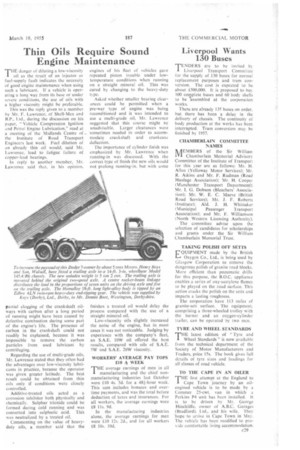Thin Oils Require Sound Engine Maintenance
Page 87

If you've noticed an error in this article please click here to report it so we can fix it.
THE danger of diluting a low-viscosity oil as the result of an injector or fuel-supply fault indicates the necessity of good engine maintenance when using such a lubricant. If a vehicle is operating a long way from its base or under severe condAions, the use of oils with a higher viscosity might be preferable.
This was the reply given to a member by Mr. F. Lawrence, of Shell-Mex and RP:, Ltd., during the discussion on his paper, " Vehicle Compression Ignition and Petrol Engine Lubrication," read at a meeting of the Midlands Centre of the Institute of Road Transport Engineers last week. Fuel dilution of an already thin oil would, said Mr. Lawrence, lead to fatigue failure of copper-lead bearings.
In reply to another member, Mr. Lawrence said that, in his opinion.
partial clogging of the crankshaft oilways with carbon after a long period of running might have been caused by defective combustion during some part of the engine's life. The presence of carbon in the crankshaft could not readily be explained, because it was impossible to remove the carbon particles from used lubricant by centrifuging.
Regarding the use of multi-grade oils, Mr. Lawrence stated that they often had the advantages over low-viscosity lubricants in practice, because the operator was given greater latitude. The best result could be obtained from . thin oils only if conditions were closely controlled.
Additive-treated oils acted as a corrosion inhibitor both physically and chemically. Sulphur trioxide could be formed during cold running and was converted into sulphuric acid. This was neutralized by a treated oil.
Commenting on the value of heavyduty oils, a member said that the engines of his fleet of vehicles gave repeated piston trouble under lowtemperature conditions when running on a straight mineral oil. This was cured by changing to the heavy-duty type.
Asked whether smaller bearing clearances could be permitted when a pre-war type or engine was being reconditioned and it was intended to use a multi-grade oil, Mr. Lawrence suggested that this course might be unadvisable. Larger clearances were sometimes needed in order to accommodate crankshaft and crankcase deflection.
The importance of cylinder finish was emphasized by Mr. Lawrence when running-in was discussed. With the correct type of finish the new oils would not prolong running-in, but with some finishes a treated oil would delay the process compared with the use of a straight mineral oil.
Low-viscosity oils slightly increased the noise of the engine, but in most cases it was not noticeable. Judging by experience with the company's fleet, an S.A.E. lOW oil offered the best results, compared with oils of S.A.E. SW and S.A.E. 20W viscosity.
WORKERS' AVERAGE PAY TOPS flO 4 WEEK THE average earnings of men in all manufacturing and the chief nonmanufacturing industries last October were £10 4s. 5d. for a 4812-hour week. This sum includes bonuses and overtime payments, and was the total before deduction of taxes and insurances. For all workers, the average earnings were
Its. 9d.
In the manufacturing industries alone, the average earnings for men were €10 12s. 2d., and for all workers €8 10s. 10d.








































































































































































































































































